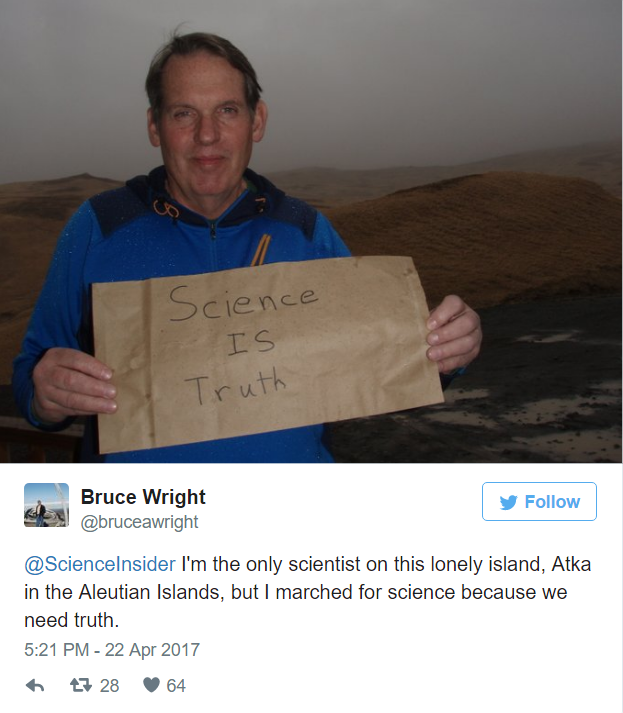By Natasha Crain
There’s a new hero in town. He’s thought to be all-powerful, always right, and everyone’s best friend. If anyone says something that could possibly be construed as being opposed to this hero, they are to be quickly shamed and put in their place. You see, if the world wants to move forward productively and intelligently—or so the story goes—they must get in line behind this hero.
He is today’s “way and truth.”
His name is science.

And tens of thousands of people marched for him last weekend in the “March for Science.”
If it sounds funny to give human attributes to the concept of science, don’t blame me. I’m only talking about science in the same kind of terms that the secular world effectively does.
To be sure, this hero isn’t actually new. He’s been promoted as such for a few centuries. But his popularity is skyrocketing today. He’s become a mainstream idol and he’s literally being paraded as a replacement for God.
In this post, we’ll look at how the secular world has turned science into an idol, and how we can teach kids not to bow to it.
To be clear: This post is about combating the idol of science…not science itself. In fact, if you read this and conclude that I’m opposed to science because I used the words combat and science in the same post, it’s a good sign you’ve fallen prey to the very mentality I’m describing.
Understanding How the Secular World Has Turned Science into an Idol
Before we can understand how to combat the idol of science, we have to understand how the secular world has created the idol in the first place. Here’s the basic strategy.
1. Proclaim that science is the only reliable way to determine what’s true about our world.
The Huffington Post featured an article with “19 of the Cutest and Funniest Kids from the March for Science.” One picture shows a boy holding up a sign that says, “Make America Think Again” and is wearing a shirt that says, “In Science We Trust.”
One man bluntly stated that science is truth:
Similar examples abound.
This idea—that science is the only trustworthy way of learning about our world—is the key philosophical starting point for those who want to replace God with an idol of science. (Note that this was exactly the thinking behind the ridiculous Scientific American article on the resurrection that I critiqued in my last blog post.)
If you can convince the masses that “science” is synonymous with truth, it’s quickly implied that no other sources of truth are necessary. Who needs the Bible when we can figure everything out in test tubes?
2. Promote a false dichotomy between “science” and theism so people feel they have to make a choice.
With point 1 firmly in place, people are ready to start believing that science and theism (belief in a personal God) are a trade-off. You pick one as your source of truth. But don’t think for a minute the choices are being hailed as equally viable. Those who pick God are to feel ashamed for being backward and unscientific. After all, it’s assumed they rejected science.
So choose science and join others who made the obvious choice for truth at the cool kids’ table.
That’s the message.
3. Use the word science in a such a variety of ways that people stop trying to clarify what exactly is meant by “science” in any particular context and accept whatever is claimed in its name.
March organizers said they were doing it to encourage “scientists, educators, and advocates, as well as social service workers, artists, trade workers, business people, our elderly population, and families to come together for science.”
Sounds pretty harmless, right? As one 8-year-old said, “Trees make oxygen. It helps us breathe. Who doesn’t like that?” Other kids held up similar non-controversial posters that said, “I love my microscope”; “Future scientist”; and “Science: Experiment, Learn, Fail, Repeat”; and “Science Matters.”
There’s basically no one who would have a problem with any of those statements. In fact, you might even begin feeling a wee bit silly for ever casting a skeptical eye on the March in the first place. But that’s precisely the problem. Non-controversial statements are a smokescreen for the myriad other pieces of secular worldview being promoted under the umbrella term “science.”
If the March was only about science as a field of study, as these examples would imply, no one would need to march at all.
People march because they want something.
They want you to believe something or do something. And if you take a survey of the statements made by marchers, it’s clear they are using the word science interchangeably to mean a variety of things:
- A field of study (as in, science is the systematic study of the natural world)
- Scientists (the people who engage in that field of study)
- Findings of scientific research
- Interpretation of the findings of scientific research
- Consensus on the interpretation of the findings of scientific research
- Policy decisions that in any way touch on any of the above
It’s an effective strategy that you can see everywhere in media today. Establish that science is the only reliable way to gain knowledge about the world, convince people they need to choose science or God, then smuggle in whatever you want to put forward as truth under the generic label of “science” and make everyone think disagreement is for the uneducated fools who didn’t make the smart choice.
Don’t believe it for a minute.
The Art of Raising Kids Who Won’t Bow to the Science Idol
As Christian parents, we must help our kids understand science as nothing more and nothing less than what it is: an extremely important field of study that can give and has given us a wealth of knowledge about the workings of God’s creation.
We can modify the three points above to see what our kids really should know.
1. Scientific research is one (important) way to determine the truth about our world.
Scientific research reveals the mechanics of the universe at a level of detail far beyond what God has revealed to us in the Bible. There’s no verse in the Bible, for example, that states the force of gravity. Science complements our knowledge of God because it reveals the workings of the world He created. Christians need the field of science as much as those with any other beliefs.
But science can say nothing about the ultimate meaning or purpose of our universe, or where all those laws of nature came from in the first place. You can study how a marble maze works, and describe those actions and mechanisms fully, but that doesn’t answer the questions of how the maze came together, why it’s there, and what we should do with it.
To answer these kinds of questions about the universe, we need the input of the One who created it. In that way, the Bible complements science.
2. There need never be a choice between science and God.
Far from being polar opposites, science needs God.
The goal of science, broadly, is to discover the order of the universe. But the feasibility of that goal depends on the assumption that the workings of our natural world can be discovered. We often take that for granted, but we shouldn’t.
Our universe is both understandable and logical. These characteristics allow us to do science in the first place. If the universe was just a hodgepodge of chaotic events, ungoverned by structured laws, science would be a hopeless task.
But why is the world intelligible rather than chaotic?
If the universe is truly the product of unguided evolutionary forces, as atheists claim, there’s no reason to expect that an elegant ordering of nature would happen on its own. But if the universe is the product of intelligence, as Christians and other theists claim, we would expect it to be orderly—a reflection of its rational designer.
Much more could be said on this, but the bottom line is that there is no trade-off between science and God. It’s a false dichotomy. You can pretend you’re “choosing” science, but your choice has no legs to stand on its own. You need God and science.
3. Thoughtful conversations about “science” must be nuanced enough to determine which meaning of science we’re talking about.
Let’s revisit the various meanings of science to see just a few questions that could be asked about any statement like, “Science says X.”
- A field of study: Science, as a field of study, can say nothing. Only people say things. So, no, science doesn’t say X.
- Scientists: Which scientists? Which field are they in? What are their credentials for speaking on this particular subject? What is the context for what they said? Who disagrees? Why do they disagree?
- Findings of specific scientific research: How was the study designed? What was being tested? What was assumed? Who conducted it?
- Interpretation of the findings of scientific research: What have prior studies on the subject found? What further research is needed to understand or test these findings? Is there a reason to believe this particular study is authoritative in some way? Where is the line between the findings of the study and what people are saying should be done with those findings?
- Consensus on the interpretation of the findings of scientific research: When consensus is claimed, who is included in that consensus? How is consensus measured? Who has determined that consensus has been reached? What reasons do we have for believing the consensus?
- Policy decisions that in any way touch on any of the above: The questions here are literally endless. Even if 100 percent of people agreed about the interpretation of 100 percent of scientific findings, there could be endless (legitimate) discussion on what the best policy measures should be based on those findings.
“Science says X” is an authoritative statement built on a foundation of hundreds of assumed answers to questions like these. What happens when we get tricked into believing that anything labeled science is authoritative?
This.
This is from Bill Nye’s new Netflix show, Bill Nye Saves the World, in which he “educates” the public on science issues.
This is being promoted as science.
I apologize for posting something of such a graphic nature, but this needs to be seen to be believed.
Incredible.
So, to the little boy who said, “Trees make oxygen. It helps us breathe. Who doesn’t like that?” the answer is no one.
Absolutely no one.
But that’s not the science the secular world wants us all to “like.” That science is an idol made by hands of people who want God off His throne.
Do not bow down.
Original Blog Source: http://bit.ly/2rRhlAU



















Facebook Comments